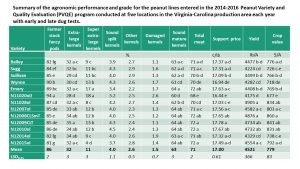Growers in Virginia, North Carolina, and South Carolina are always in need for high yielding, disease resistant and early maturing peanut varieties with good grading and processing quality. The multi-state Peanut Variety and Quality Evaluation (PVQE) program evaluates advanced breeding lines from the North Carolina State University and University of Florida breeding programs that can further be released as Virginia-type cultivars suitable for the region. These lines are compared with the current commercial cultivars, ‘Bailey’, ‘Sugg’, ‘Sullivan’, ‘Wynne’, and ‘Emery’ for yield and quality throughout the production region in Virginia, North Carolina and South Carolina. The 2016 report with the agronomic and grade PVQE data is available here :http: //pubs.ext.vt.edu/AREC/AREC-198/AREC-198.html. A summary of the 2014-2016 agronomic and grade performance is presented in the table below. In average of 3 years and five locations each year, ‘Bailey’ produced 4,477 pounds per acre and the crop value was 776 dollars per acre. Some of the new lines, however, significantly exceeded ‘Bailey’ for both pod yield and crop value; lines N11028ol and N12008CLSmT in particular. Unlike ‘Bailey’, which has normal oil chemistry, all the breeding lines tested recently in the PVQE program are high oleic. This means they have over 75% of their oil content made of oleic fatty acid; and this characteristic extends the freshness and shelf life of the peanuts from 4 to 32 weeks.

